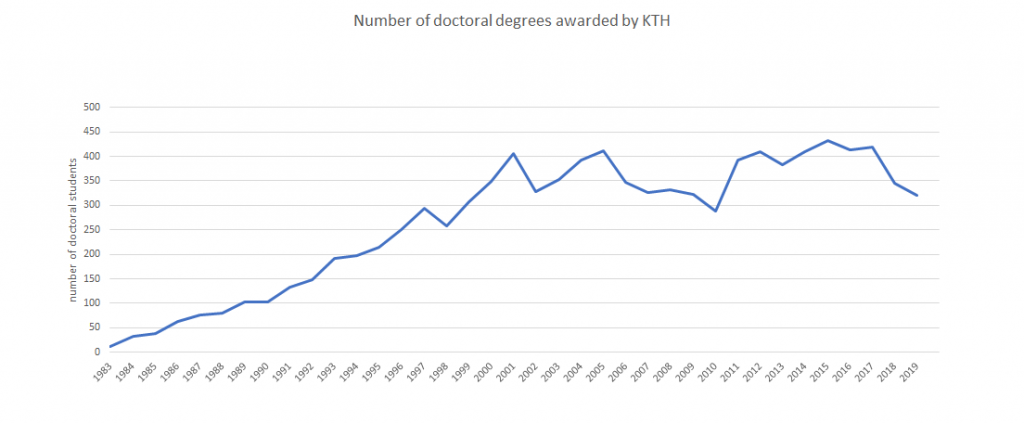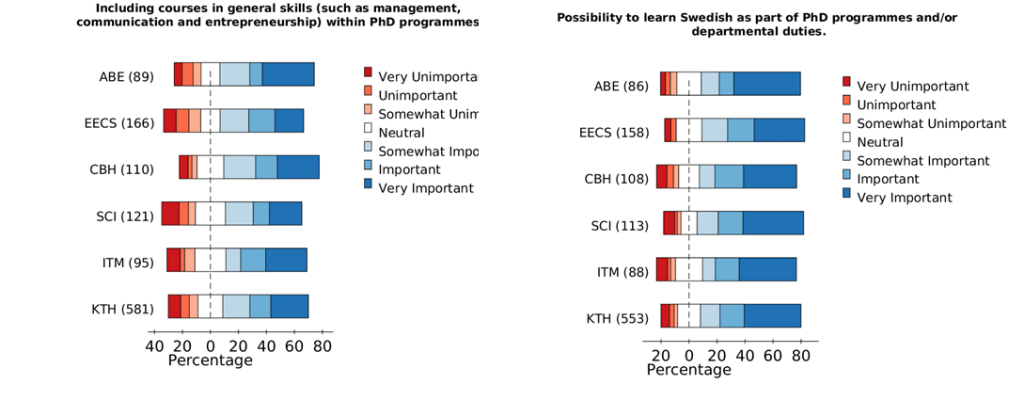On 18th November, Mohit Daga (Vice-Chairperson, PhD Chapter) gave a presentation about doctoral education at the KTH’s Board of Education (Sv: Utbildningsnämnden, UN) and SCI School’s FA+PA group.
Presentation at UN
In addition to presenting data from the Doctoral student survey report, the presentation at UN touched upon some perennial aspects of doctoral education. Previously, the doctoral student survey has also been presented at the third cycle education network (Sv: Forskarutbildningsnätverket, FU-Nät), the Faculty Council (Sv: Fakultetsrådet, FR), and at the third cycle education committee (Sv: Forskarutbildningsutskottet, FU). From the doctoral survey, the presentation included key aspects of doctoral education: supervision, doctoral courses, stress and well-being of doctoral students. The presentation also talked about issues concerning international doctoral students.

A recent UKÄ report notes that three years after graduating, 62% (4,630) of foreign doctoral students had left Sweden while 38% (2,720) were still in the country. Sweden has a population of about 10 Mn, if thousands of its doctoral students continue to leave the country then it is certainly a matter of concern. There are two ways moving forward, a pessimist approach of continuing to being nonchalant about the problem and accepting that nothing can be done or an optimist solution, leading to coming up with creative ideas to take this problem head-on. In the presentation made at the UN some ideas to resolve this issue were discussed.
a) Enabling conditions for Pre-Doc (sabbatical during doctoral studies). Currently, doctoral students are widely discouraged from pursuing a pre-doc, that is a sabbatical during doctoral studies. Often Chapter 5 of Högskoleförordning (1993:100) is cited to disallow doctoral students to pursue sabbatical (absence of leave). Sabbatical period or internships could be easily offered by companies due to employment regulations. It is also easier for research universities to host a pre-doc than a post-doc. A sabbatical period could be an easy solution to help foreign doctoral students build a research network in Sweden. There are many benefits of the same, a prime among them is to encourage them to stay in Sweden after doctoral studies.
b) General skills-based courses in the PhD programs. As seen from the above graph there is a steady rise in the number of doctoral students. It has become increasingly hard for universities to absorb all the doctoral students that graduate. It is now more important than any time in the past to prepare doctoral students for different career opportunities apart from academic careers where their scientific knowledge could be used. In the survey conducted by the PhD chapter around 70% doctoral students considered it important to include courses in general skills within the PhD programs. Having such an opportunity shall help doctoral students for career outside academia, and perhaps in Sweden.

c) Possibility to Learn Swedish as Departmental Duties. Thanks to the international culture at KTH, today, it is possible for international doctoral students to spend 5 years in Sweden, obtain a doctoral degree and still not learn basic conversational Swedish. This international culture is important to attract top talent. But then, how do we encourage doctoral students to pick up the local language? Any policy measure, which makes compulsory learning of Swedish shall make it disadvantageous for some. We need to think of out-of-the-box solutions. Can we provide 5% of departmental duties for doctoral students to learn the Swedish language? Perhaps, an incentive-based mechanism, where only regular course completion would entail future extension of such an entitlement. Learning Swedish has academic benefits as well, for example, this will allow international doctoral students to work as a teaching assistant for courses conducted in Swedish, during their doctoral education. There could be many ways to support the training of the Swedish language; various schools at KTH are sitting on high buffer of GRU money, this money could be used to fund Swedish education for doctoral students. A similar model is used for the pedagogical training of doctoral students. In the doctoral student survey, 80% of doctoral students responded that it is important to learn Swedish as a part of PhD programs and/or departmental duties. If doctoral students learn Swedish, it will help them to stay in Sweden, as many academic and industrial jobs require Swedish proficiency.
Presentation at SCI School’s FA+PA Group
The SCI School’s Director of Research Studies (Sv: Forskningsutbildningsansvarig, FA), Anna Delin invited Mohit Daga to present the doctoral student survey at the School’s FA+PA group. In this meeting, the focus areas were different from UN. The concrete points apart from the doctoral survey that were discussed here included providing the SCI School’s doctoral council members with time compensation, especially for the ones who are about to graduate soon (before the central guidelines on doctoral students’ time compensation); resolving issues concerning the compensation of departmental duties (time spent vs time compensated); and re-visiting the high credit requirements for the applied and computational mathematics program.
This blog was posted by Mohit Daga, Vice-Chairperson of DR for the year 2020.

